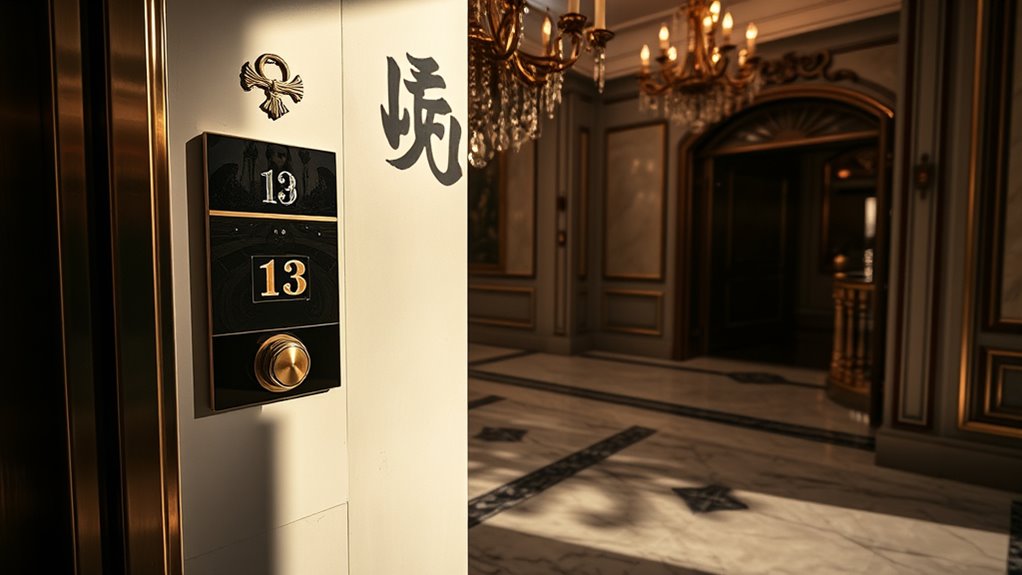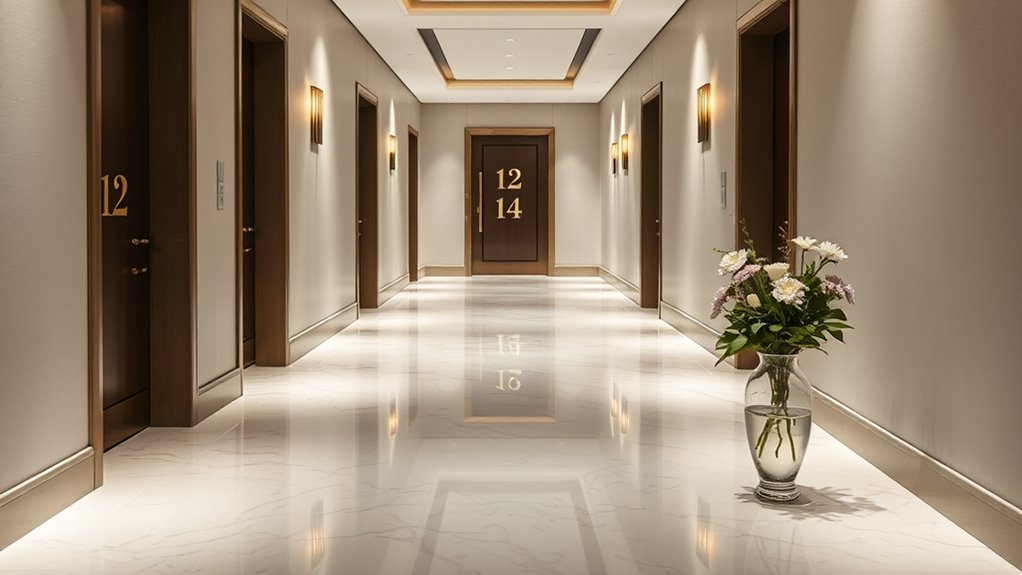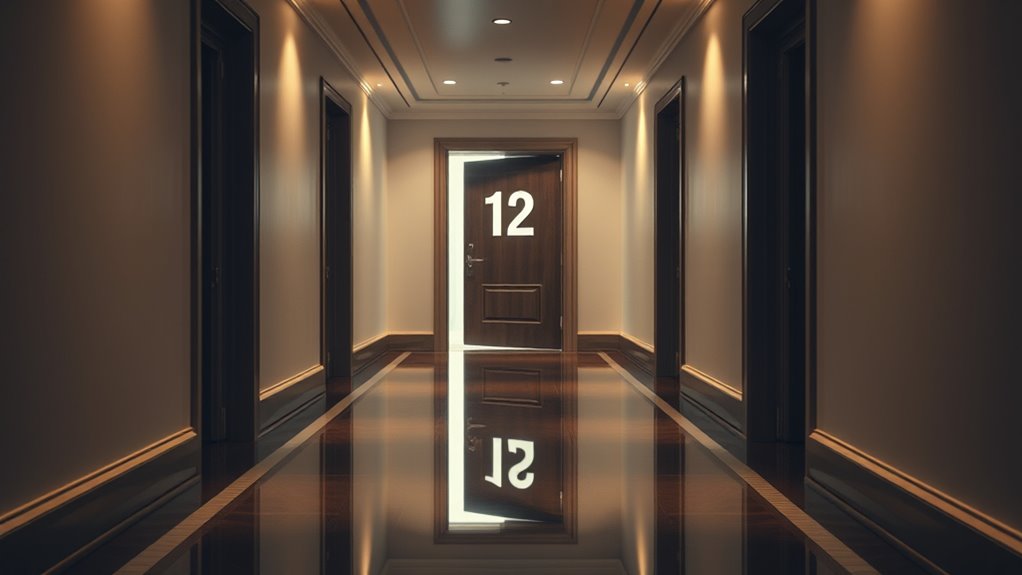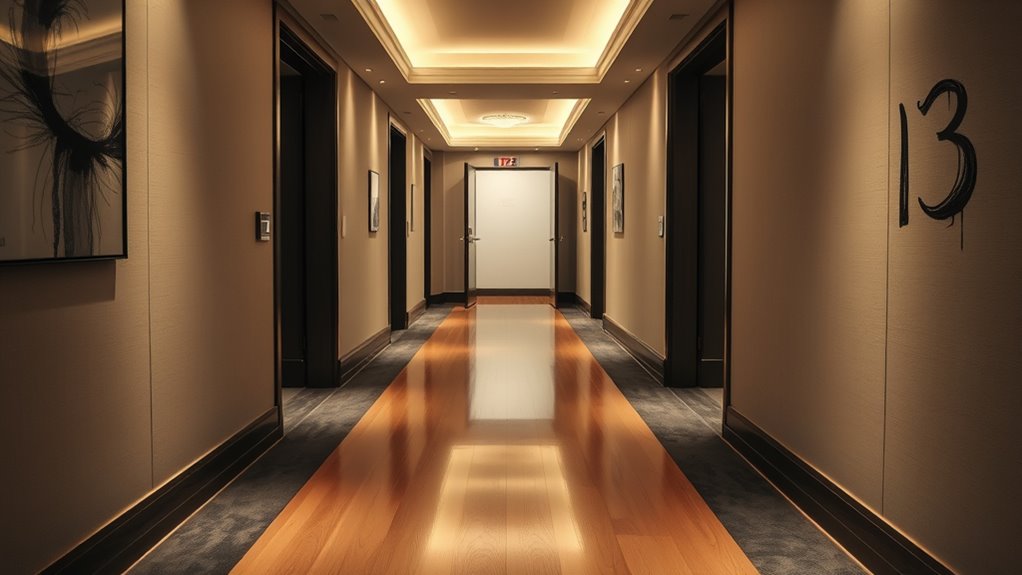You’ve likely noticed hotels often skip the 13th floor, and it all ties back to superstition. Many believe the number 13 brings bad luck due to historical and cultural reasons, like associations with the Last Supper or ancient myths. To make guests feel comfortable, hotels label the floor above 12 as 14 or 12A instead. This practice shows how beliefs influence design—yet there’s more to explore about how these traditions shape the hospitality world today.
The Origins of the Number 13 Superstition

Although the fear of the number 13 might seem like a modern quirk, its roots stretch back centuries, woven into various cultures and myths. When you explore the triskaidekaphobia origins, you’ll find that historical beliefs often portrayed 13 as an unlucky or ominous number. In Norse mythology, 13 guests at a banquet led to chaos, while Christian tradition recalls 13 individuals at the Last Supper, with the 13th being Judas, the betrayer. These stories, among others, shaped the idea that 13 brings misfortune. Understanding these historical beliefs helps you see why this superstition lingers, influencing modern decisions—like skipping the 13th floor in hotels. It’s a fascinating example of how ancient fears still impact your everyday environment, even if you don’t consciously realize it.
Historical Examples of Triskaidekaphobia
When you look back through history, you’ll find plenty of examples where the fear of the number 13, known as triskaidekaphobia, influenced decisions and behaviors across different societies. Exploring triskaidekaphobia origins reveals how deeply historical beliefs shaped this superstition. Here are some notable instances:
The fear of 13, or triskaidekaphobia, has historically shaped decisions across cultures worldwide.
- In medieval Europe, many believed having 13 guests at a table was bad luck, inspired by the Last Supper’s 13 attendees.
- Norse mythology tells of a mischievous 13th god, Loki, whose arrival caused chaos.
- In early American architecture, some buildings omitted the 13th floor to avoid unsettling tenants.
- Sailors traditionally avoided setting sail on the 13th day, fearing storms and misfortune.
These examples show how historical beliefs continue to influence modern practices, like skipping floor 13 in hotels, reflecting a desire to sidestep perceived bad luck.
Cultural Variations in Number 13 Beliefs

Since beliefs about the number 13 vary widely across cultures, you might be surprised to learn that it’s not always considered unlucky. In fact, cultural perspectives on the number 13 differ greatly, shaping how it’s viewed around the world. For example, in some parts of Italy, 13 is actually a lucky number, symbolizing prosperity and life. Meanwhile, in many Western countries, global beliefs often paint 13 as ominous, influencing hotels to skip the 13th floor entirely. Understanding these cultural perspectives helps you see that superstition is deeply tied to local history and tradition rather than universal truth. So, when you encounter a missing floor 13, remember it’s just one way culture influences architecture and our collective comfort with numbers.
How Hotels Implement the Floor 13 Omission
When you stay at a hotel that skips the 13th floor, you might notice the numbering jumps from 12 to 14, cleverly avoiding the unlucky number. This choice isn’t just about superstition—it’s also a strategic move in marketing and design to make guests feel more comfortable. Hotels tailor these adjustments with cultural sensitivity in mind, ensuring they respect diverse beliefs while keeping their spaces inviting.
Numbering Adjustments
A hotel’s floor numbering system is more than just a simple count—it’s a carefully planned sequence designed to avoid the number 13 altogether. When you step into a hotel, the floor numbering subtly shapes your experience and guest perceptions, steering clear of any superstition-related discomfort. Here’s how hotels typically adjust their floor numbering:
- Skip the 13th floor entirely, jumping from 12 to 14.
- Rename the 13th floor with a different label, like 12A or M (the 13th letter of the alphabet).
- Use alternative numbering systems, such as letters or themes, to replace numbers.
- Adjust elevator buttons and signage to reflect these changes seamlessly.
These shifts help maintain a smooth, worry-free atmosphere while respecting guests’ preferences and beliefs.
Marketing and Design
Although omitting the 13th floor might seem like a simple choice, the way hotels incorporate this decision into their marketing and design is quite strategic. When you step into such a hotel, you might not even notice the missing floor number, but this absence plays a key role in their branding strategies. Hotels tap into consumer psychology, understanding that many guests associate the number 13 with bad luck. By skipping it, they create a subtle sense of comfort and reassurance, which enhances your overall experience. This omission also becomes a unique talking point or a quirky feature that hotels can highlight in their marketing, appealing to guests who appreciate thoughtful, guest-centered design. It’s a clever blend of superstition and strategy designed to make you feel at ease.
Cultural Sensitivity
Since cultural beliefs about the number 13 vary widely, hotels often tailor their floor numbering practices to respect local superstitions and guest comfort. When you stay at a hotel, you might notice how these superstition variations influence design choices. Here’s how hotels implement the floor 13 omission with cultural sensitivity:
- Renaming Floor 13 as 12A or 14 to ease guest anxiety
- Considering regional superstitions—some cultures fear different numbers
- Communicating floor numbering clearly to avoid confusion
- Balancing tradition with modern guest expectations for comfort
The Impact of Superstition on Hotel Design
When you step into a hotel and notice the absence of a 13th floor, you’re witnessing how deeply superstition shapes design choices. Hotel architecture often reflects the superstition influence, as designers and owners aim to create spaces that feel safe and inviting. The number 13 has long been associated with bad luck, so many hotels skip it entirely, labeling the floor above 12 as 14 instead. This decision isn’t just about tradition; it’s a strategic move to ease guests’ minds and avoid discomfort. By omitting the 13th floor, hotels subtly respect cultural fears while maintaining a smooth flow in their layout. This blend of superstition and practical design shows how beliefs can directly impact architectural choices, shaping your experience without you even realizing it.
Psychological Reasons Behind Avoiding Floor 13

Beyond the influence of tradition and superstition on hotel design, there’s a deeper psychological layer at play in skipping the 13th floor. When you stay in a hotel, the number on your floor can subtly affect how you feel. The psychological impact of floor numbering taps into fear avoidance, helping guests feel more at ease. Here’s why avoiding floor 13 matters:
- It reduces anxiety linked to triskaidekaphobia (fear of number 13).
- It prevents guests from associating their stay with bad luck.
- It supports a more relaxed and welcoming environment.
- It helps guests focus on enjoying their freedom without irrational fears.
Alternative Numbering Systems in Buildings
Although many hotels skip the 13th floor entirely, you might be surprised to learn that some buildings use alternative numbering systems to address superstitions and cultural preferences. Instead of labeling it as “13,” they might opt for “12A,” “12B,” or even jump directly to “14.” This approach allows architects and builders to respect cultural sensitivities without altering the physical structure. Alternative numbering reflects a clever balance between tradition and modern building design, showing how creativity can overcome superstition. When you encounter these unique floor labels, you’re witnessing a subtle but effective strategy to make guests feel comfortable and free from anxiety. This design choice guarantees that the building’s layout remains intact while honoring diverse beliefs about numbers.
Cases Where Hotels Do Not Skip the 13th Floor
Not every hotel chooses to avoid the number 13 on their floor plans. If you’re curious, you’ll find several hotels with 13th floor as notable exceptions to the superstition. These places embrace the number, reflecting a spirit of freedom and nonconformity. Here are some reasons why some hotels keep the 13th floor:
Some hotels proudly keep the 13th floor, embracing uniqueness and defying superstition with boldness and authenticity.
- They aim to challenge superstitions and promote open-mindedness.
- Some buildings use 13 for marketing uniqueness or charm.
- International hotels where the number 13 isn’t considered unlucky.
- Historic hotels preserving original floor numbering for authenticity.
The Economic Effects of Skipping Floor 13
When hotels decide to skip the 13th floor, it’s not just about superstition—they’re also making a business decision that can impact their bottom line. You see, the economic impact of this choice ties directly to consumer behavior. Many guests feel uneasy staying on the 13th floor, so omitting it helps hotels avoid potential lost bookings or complaints. By renumbering floors, hotels create a more comfortable environment, encouraging more reservations and higher occupancy rates. This small adjustment can boost revenue, as guests often prefer places that respect their comfort and beliefs, even if irrational. So, while it might seem trivial, skipping the 13th floor is a strategic move hotels use to align with customer preferences and maximize profitability in a competitive market.
The Future of Floor Numbering and Superstitions
You might notice that floor numbering is slowly evolving, with some hotels opting for creative alternatives instead of just skipping 13. As superstitions shift with new generations, the fear around the number 13 is fading in some places but still strong in others. It’s interesting to see how these changes will shape hotel design and guest experiences in the future.
Evolving Numbering Practices
How will hotels adapt their floor numbering as superstitions evolve in modern society? You’ll notice that evolving traditions and shifting societal perceptions push hoteliers to rethink numbering. Rather than sticking to old beliefs, many are experimenting with creative solutions to respect guests’ comfort and freedom.
Here’s what you might see more of:
- Using alternative labels like “12A” instead of “13.”
- Incorporating cultural insights to suit diverse guests.
- Embracing technology to customize floor naming digitally.
- Phasing out superstition-based omissions for straightforward numbering.
Changing Superstition Trends
As superstitions surrounding the number 13 continue to fade, hotels are starting to rethink their approach to floor numbering. Changing beliefs and shifting societal perceptions mean many guests no longer fear the number 13, prompting a fresh look at traditional practices. You’ll notice some hotels embracing transparency, simply numbering all floors sequentially. Others experiment with creative labels to appeal to modern travelers seeking freedom from old taboos.
| Trend | Description | Example Hotels |
|---|---|---|
| Sequential Numbering | All floors numbered, including 13 | Boutique urban hotels |
| Symbolic Renaming | Floor 13 renamed with positive symbols | Wellness resorts |
| Guest Preference | Allow guests to choose floor number | Innovative chains |
| Cultural Adaptation | Numbering adapts to local beliefs | International hotels |
| Technology Integration | Digital displays customize floor info | Smart hotels |
You’re witnessing a new era where superstition yields to modern values.




